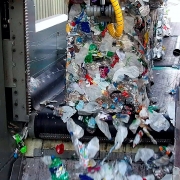Plastics Committee: Middle East Gears Up for Plastics Recycling
A commitment to recycling plastics of all types is developing steadily in the Gulf, the BIR Plastics Committee heard at its meeting in Dubai on 18 October 2022. The insights came in a presentation from Bashar Ehsan Gadawala, Managing Director, Ala Group in the UAE entitled “Opportunities and challenges in plastic recycling in Middle East”.
Mr Gadawala said the UAE was developing an action plan for plastics management and recycling based on the European Union and the OECD’s ‘life-cycle approach’. New commitments included more use of recycled and bio-based plastics, reduced use of plastics, better design and new investments in infrastructure.
Examples included Abu Dhabi which in September launched a global digital trading platform for recycled plastics, said to be the first of its kind. “Rebound Plastic Exchange” has been introduced to facilitate the trade of five million tonnes of recycled plastic by 2025 but Mr Gadawala said producers were “still a bit hesitant to use recycled content” and Governments in the region were looking to educate their businesses. “Producers and users know that if concerns are not addressed, they risk facing more stringent regulations and also pressure from customers,” he added.
During questions, panellist Mahmoud Al Sharif of the Sharif Metals Group DMCC in the UAE reinforced the speaker’s observation on regional momentum. “Governments are investing a lot in plastic recycling facilities. There will be new legislation to be implemented by next year that plastic products must have 30% recycled content. We are following in the footsteps of Europe and the US and that’s a good step forward.”
Another panellist, BIR Tyres & Rubber Committee Chairman Max Craipeau of Greencore Resources Ltd, said the EU’s 30% minimum content applied only to PET products, rather than the UAE’s intervention for all plastic types. “Imagine if that happened in Europe. Companies and brands would have no choice but to use mandated 30% content and that would support the recycling industry.” He said that without any such mandates, producers and brands would switch to virgin when it was cheaper. “The only party who can support recycling, no matter the electricity costs, is the legislator. I am happy to see this region is taking such a move.” Sally Houghton, Executive Director, Plastic Recycling Corporation in the USA, said it was also important to concentrate on collections. “We can set as many mandates as we like but if we don’t collect the materials, we won’t have the volume.
Committee Chairman Henk Alssema of Vita Plastics in the Netherlands said the industry in Europe was “reeling under pressure due to high electricity charges, low demands for raw materials, low prices, lack of labour and inflation; it looks like a mess”. He added that energy costs, which were normally around 15-20% of production costs for European recyclers, had recently jumped to nearer 70%. “That’s a huge problem. Recycling companies are switching off and we have huge feedstocks.”
Mr Gadawala said high prices were not an issue in his region. “Indeed, we see a lot of European companies coming and opening a branch here to make compounds because they want to target the African or Middle East market.”
A separate presentation, on extended producer responsibility (EPR), was delivered by Xavier Lhoir, Director Operations & Circular Economy at Valipac, Belgium’s accredited organisation for EPR in commercial and industrial (C&I) packaging, the only one of its kind in the EU and treading a path that other member states will have to follow by 2024. It deals with 250 waste managers and 7,000 clients.
He stressed the model was based on a free market with no interference by Valipac in the financial relation between a company producing C&I packaging waste and the collector, nor that between a waste management company, trader and recycler. “In order to fulfil the expectations of brand owners and those of the public authorities, an EPR system based on the free market relies on the collaboration with its stakeholders, their transparency and the quality of the information they communicate,” Mr Lhoir said.
Source: BIR (Brussels, 22 October 2022)






